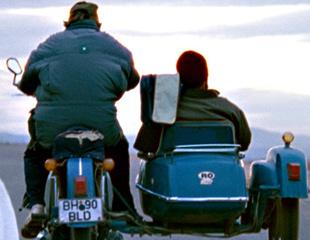Last week, at Iaşi, in Romania, people had the chance to discover new and intriguing films at the second edition of International Iasi Film Festival. Top prize winner was Georgian-director Levan Koguashvili’s Street Days. Koguashvili, who previously directed The Debt, the 2006 Sundance Film Festival short, said his debut feature “is about a strange and a very sad generation. These people were born and grew up in the Soviet Union, but after this country collapsed in front of their eyes, they were forced to adapt to a different reality. For many of them this new reality was very difficult. Wars, poverty, power-shortges, and also a new and strange capitalist environement. For those who survived the wars and poverty, capitalism became an insurmountable obstacle. Having grown up in the corrupt but care-free Soviet system, they couldn’t find their place in a new but no less corrupt Georgian reality driven by the search for capitalism”.
Already the winner of four awards at this year’s edition of Locarno Film Festival, Marian Crişan’s Morgen (see pic above) claimed the Best Romanian feature award.
For the Best Animation award, the jury chosed Magdalena Osinska’s 13-minute Zbigniev’s Cupboard – a story inspired by a letter from the director’s father, who wrote about the struggle to live a basic life in communist Poland. It is a stop frame animation, which used a mixture of 2D and 3D styles within its design, combined with both special and visual effects, to achieve its surreal aesthetic.
Serbian filmmaker Boris Mitiç’s Goodbye, how are you won the Best Documentary award. This essay-film speaks about how citizens use language to critique – and resist – the politics, governments, and utter madness that surrounds them.
While Romanian cinema has become a mainstay at many prestigious film festivals in the world (see the most recent editions of Berlin, Cannes and Locarno), organizing a film festival in Romania is not an easy task, and Festival Director Emanuel Lăzărescu hasn’t denied the festival’s growing pains. “Besides the money problem, there is the fact that outside Bucharest there are very few cinemas that can screen a movie with a good quality” also adding, “I’m glad that people liked our selection of films. And also I was glad that the public liked the Romanian movies. If a movie is good, people will come to see it”.
Vlad Gliga, IIFF’s project manager, was not as pleased as Lăzărescu, though, stating for CineBlog.info “It could’ve been better. We shouldn’t have technical problems, we should’ve had more movie theaters, we should’ve promoted the event better. But it could’ve been worse. We could’ve had less and worse movies, we could’ve had no public”. I liked the passion he denoted when asked about the next edition, — “IIFF 2011 will take place no matter what. We’ll do it as good as we can, we’ll have a selection of films as good as this year’s (because I understood that the films in the competition were very good), we’ll be better organized even if we won’t have any money. IIFF will take place even in 2050”.
IIFF 2010 is proof that the enthusiasm for film can defeat the lack of money and, I guess, this is what makes Romanian movies great: important films, passionate filmmakers and equally enthusiastic film fest curators. In many ways, survival is due to a stubbornness to create valuable things.
